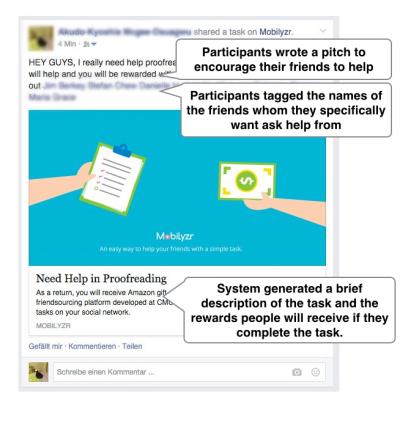HCII @ CHI: Making the Most of Your Facebook Friends

Everyone has that friend — the one who takes to Twitter or Facebook to ask their followers for advice on a new appliance, questions about logistics for an upcoming event, or even which movie they should see on Saturday. In the human-computer interaction field, this sort of behavior is called "friendsourcing," and researchers have long been attempting to build systems that tap into this largely unexplored resource. But friendsourcing requests often go unanswered, even when they require only a simple answer. Larger requests that involve tasks, like proofreading a resume, may be ignored because they require more time than friends are willing to provide. Asking friends for this kind of help could also hurt the requester's reputation.
The solution to attracting more respondents might seem simple: provide incentives for their help. But some studies show that offering rewards can sometimes result in fewer replies or, worse, ruined relationships. A team of HCII researchers recently tried to discover exactly what happens when you offer friends rewards for their online help in the paper "A Market in Your Social Network: The Effects of Extrinsic Rewards on Friendsourcing and Relationships." The paper, which received an honorable mention award, will be presented this week at the Association for Computing Machinery Conference on Human Factors in Computing Systems (CHI 2016) in San Jose, Calif. Authors include Haiyi Zhu, an HCII Ph.D. alumna who is now an assistant professor at the University of Minnesota; HCII Ph.D. student Sauvik Das; alumna Yiqun Cao; Associate Professor Aniket Kittur and Professor Robert Kraut.
Through a randomized, controlled experiment, the HCII set out to answer two questions: does adding extrinsic rewards to a friendsourcing request increase or decrease the response rate for the requests? And does it change how requesters view the strength of their relationships with friends who respond?
For their experiment, the researchers recruited Facebook users willing to request help from people in their friends list. Some participants were kept in a control group that made no mention of payment or reward in their request, while others were split into groups: two that offered small or large monetary awards for request responses, and two that offered small or large non-monetary rewards (in this case, candy). Each participant was required to post two requests — a pre-set task involving either completing a survey or revising a document, and a request of the participant's creation. Participants then had to tag six friends in each request, and complete pre- and post-experiment surveys that explored their feelings for the friends they tagged.
Using the data from 105 task requests, the researchers found that offering extrinsic rewards has mostly positive effects on friendsourcing. Both large monetary and large non-monetary rewards substantially increased response rates without undermining friendships. In fact, the presence of a reward allowed the requesters to develop a face-saving explanation for why their friends were unresponsive. A failure to receive help from a friend could be attributed to the friend’s desire for candy or an Amazon gift card, not the quality of the friendship.
"These results provide new theoretical insights into the strategies friends can use in an online context to solicit help, and practical implications for the design of a new friendsourcing system," the authors wrote.
The study has far-reaching implications for designing a social-network-based sharing economy service, which involves sharing or selling assets like inventory, skills and time, often through online applications. The advantage of these networks is that they produce trust between recipients without relying on regulation, background checks or explicit reputations.
"This paper suggests that overlaying external payments on the exchange of services among friends increases the likelihood that the requested work would be done, without undermining friendships," they wrote.
For more information on this initiative, read the full paper. Learn more about the HCII's participation in CHI in our overview story.
Story by Susie Cribbs (DC 2000, 2006)

